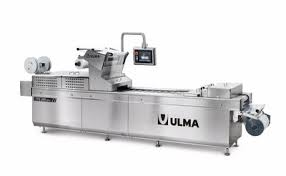
Launched at the IFFA trade show in Frankfurt, the #ULMAweCare project demonstrates ULMA’s commitment to enhancing its sustainable credentials. The manufacturer of packing machinery is promoting the reduction of packaging and the use of recyclable materials throughout the process.
With the demand for plastic packaging expected to double in the next 20 years, and the packaging industry already using 40% of the plastics processed every year, finding a solution that minimises waste, and provides a sustainable alternative to plastic, has been a priority for the business.
ULMA has sought to advance sustainability through innovation with the introduction of a range of environmentally-friendly solutions. For instance, LeafSkinTM is a packaging solution that reduces plastics usage by up to 80% and is based on a 100% recyclable flat cardboard tray. Additionally, all of the materials are fully separable.
The sustainable packaging solutions highlighted at IFFA, included ULMA’s latest thermoforming machinery. One such example is the TFS 200 MSV which is compatible with MAP, skin and vacuum processes, and is optimised for multiple applications with flexible and rigid plastic materials and some combinations of cardboard.
Chris Pickles, Managing Director of ULMA Packaging UK, commented, “The ‘Blue Planet’ effect has made reducing plastic packaging a hot topic within the food packing industry. Consumers are increasingly looking for reduced packaging and so the industry must innovate and develop new technologies. That is why ULMA is committed to investing in sustainability, and helping our customers to use less material while maintaining efficiency and product quality.
“The #ULMAweCare project represents our long-term sustainability plan. Through investment in this project we have already developed the ReducedScrap solution which can deliver up to 40% film scrap reduction as well as the FLOW-VAC, a lower reel machine, with the roll stock fed from below the level of the product feeding line.
“Sustainable innovation can change the way in which food manufacturers and packers deliver their products to consumers. Lowering plastic use while maintaining the quality of the product that customers have come to expect”, Chris concludes.







